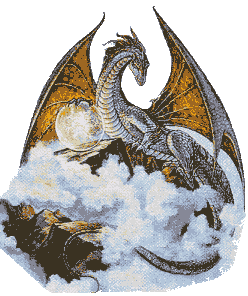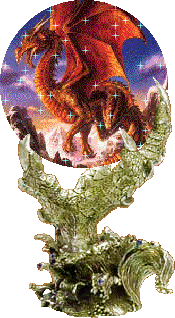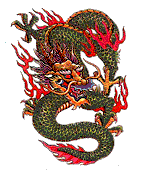Dining with Dragons

What are Dragons?
From a pagan perspective, dragons are exactly what you think they are in some ways: dragons are giant beasts that resemble winged lizards, which breathe fire and control the elements. However, for draconic pagans, the dragons represent the forces of nature that we worship. We turn to them for the ancient wisdom that they carry and work with them as any other deity.

Dragons recognize (roughly) 8 elemental categories, those being earth, water, fire, air, darkness, light, spirit, and chaos. The first four are known as the lesser elementals and the latter are known as the greater elementals. Most dragons can be sorted into these categories, but there are also dragons for any natural phenomenon that exists in the world.
Like humans, dragons have a number of different ways they can appear. You could describe their physical differences as dragon "races", although dragons themselves do not use that kind of terminology--they'd be more likely to distinguish each other by age instead of appearance. However, as humans are more visual, the easiest dragons for us to differentiate are eastern and western dragons. But don't be fooled by the idea that all Asian dragons fall into the same category! A Welsh dragon differs from a Mayan dragon just as much as a Chinese dragon does from a Thai dragon.

In general, Asian dragons tend to be longer than dragons in other regions of the world, with a more snakelike silhouette. They also breathe water, and in some countries, they're presented with a pearl on their forehead, in their claws, or hovering next to them. Many Asian dragons have beards and long whiskers. Chinese dragons in particular can be furry.
Western dragons such as the Celtic or Nordic kind tend to be large and stumpy, looking more like reptilian horses than snakes. They breathe fire and are known for hoarding gold or other shiny treasures. South American dragons resemble the longer kind in the east, but the key difference to note is the brilliantly-colored plumage they have instead of fur.
Dragons are incredibly loyal and stubborn creatures that value wisdom. If you happen to befriend one, they will remain loyal to you for life--which, for them, can be thousands upon thousands of years--assuming that you do nothing to betray their trust.

Preferred offerings for dragons include incense and strong, bitter alcohols. Individual taste obviously will change from dragon to dragon, but most of them prefer the strongest of flavors that humans can provide, given that even the smaller dragons can be so big as to not be able to taste our food. In any case, they would appreciate anything that you provide. They are often surprised when humans go out of their way to show respect due to the animosity that existed between our species in the past.



